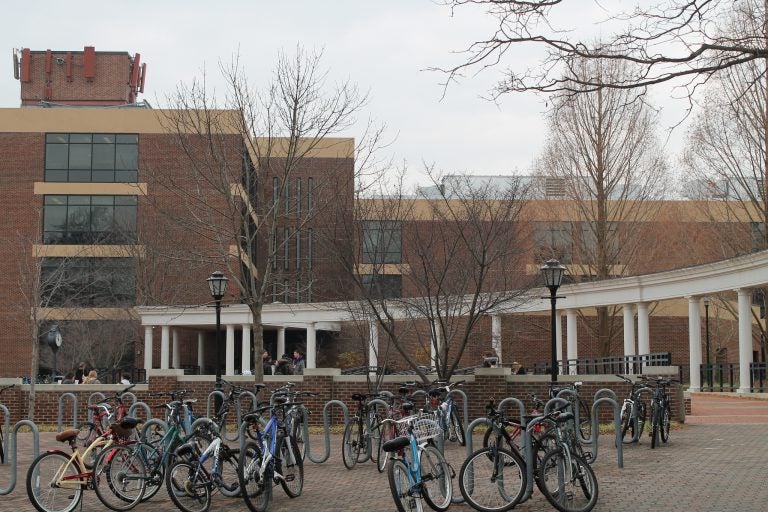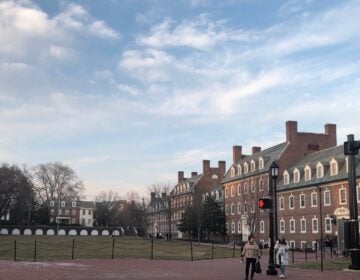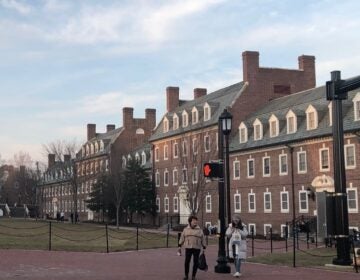New effort to curb unruly parties at the University of Delaware
Newark is taking aim at the University of Delaware’s party school reputation with a new ordinance to combat unruly ‘super parties.’
Listen 0:53
University of Delaware (DAPSS Yearbook/Flickr)
Delaware is the No. 1 party school in the nation, according to the latest edition of the Princeton Review. That ranking is based on the publication’s student survey of alcohol consumption, time spent outside of the classroom and Greek life activities.
It’s a reputation Newark police see in action every week.
“It’s become Saturday/Sunday day drinks, where hundreds of people are going there,” said Sgt. Greg D’Elia. “It became pretty regular for one single house to have a couple hundred people there.”
But the party may be over for UD students. Under an ordinance approved Monday night by Newark City Council, anyone hosting an unruly social gathering could face hundreds of dollars in fines and up to 60 hours of community service.
The ordinance defines an unruly social gathering as any gathering of four or more where three or more public nuisance behaviors are occurring. Those behaviors include underage drinking, perching on the roof, public drunkenness, public urination, violence, or drug use. Some offenses — such as public urination or public intoxication — could count against the party host even if it happens 1,000 feet away from the property.
“If you get three of those things, and it’s causing a disruption, somebody is bothered by it, or it’s creating an unsafe scene, we’re going to have to take action,” D’Elia said.
“This law is similar to the aggressive driving ordinance, where three initial behaviors must be observed before it can be initiated,” D’Elia said in a letter to Newark Mayor Polly Sierer and city council. “With aggressive driving, once initial violations are seen, the officer can cite for each moving violation, as well as the additional charges.”
That means police can still ticket party-goers individually for public intoxication and providing alcohol to minors, in addition to the new offense of hosting an unruly gathering.
The new law isn’t going over well with students. “Students are pretty angry about this one,” said student body president Kevin Peterson. “The broad discretionary powers given to police in this ordinance are an extreme overreaction that does not address real crime,” said the Student Government Association in a statement. “At a time when the city of Newark faces several escalating safety issues, such as high burglary and assault rates committed by individuals not related to the university, passing this ordinance uses students as a scapegoat for the real issues facing residents.”
The SGA is calling for the ordinance to be repealed. The group says they’ve gathered more than 10,000 signatures on a petition against the new law.
D’Elia says he’s heard some complaints from students concerned that they’ll be at risk whenever four or more students get together at a house.
“If you’re not doing any of those things on that list, you can hang out with more than four people, you can hang out with 20 people,” D’Elia said. “As long as it’s not creating a crime … or those behaviors on the list, you’re totally fine.”
Police point to a similar ordinance in Baltimore County that has helped control partying near Towson University in Maryland.
The county regularly had more than 50 unruly gatherings in off-campus student housing. But in the two years since the ordinance has been in place, only 12 such complaints have been reported, D’Elia said.
Party hosts face a $500 fine and 20 hours of community service for a first offense; a $1,000 fine and 32 hours of community service for a second offense; and another $1,500 fine and 48 hours of community service for a third offense. A fourth offense would result in a $2,000 fine and 60 hours of community service.
D’Elia’s original proposal to council would have also held property owners responsible, if they did not take steps to prevent nuisance issues on their property. Language that could have revoked property owners’ rental permits did not make it into the version of the ordinance that council approved.
WHYY is your source for fact-based, in-depth journalism and information. As a nonprofit organization, we rely on financial support from readers like you. Please give today.





